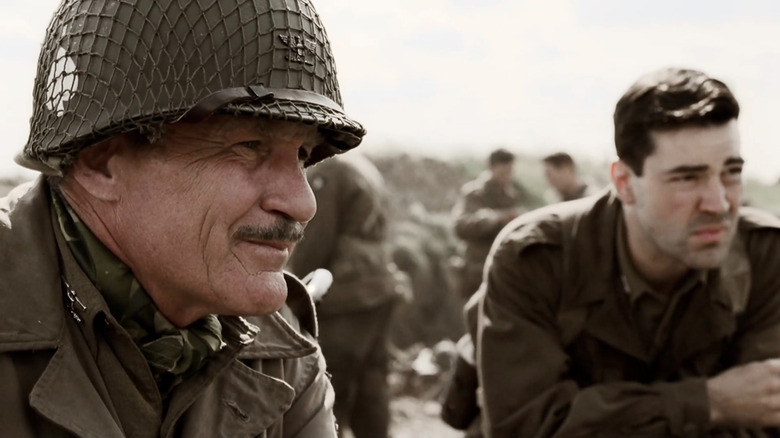Band Of Brothers' Military Experts Had The Cast Feeling A Little Apprehensive
In 2001, the first two episodes of HBO's World War II miniseries, "Band of Brothers," aired just two days before the September 11 terrorist attacks, an event that would irrevocably alter America and its perception of its own war history, much of which it has mythologized on film. However, when creators Steven Spielberg and Tom Hanks set out to adapt Stephen E. Ambrose's nonfiction book, "Band of Brothers," they wanted their follow-up to "Saving Private Ryan" to have the ring of historical authenticity.
On "Saving Private Ryan," Hanks had already found himself channeling his character, Captain Miller, when other members of the cast threatened to quit before filming even started. The experience of being forced to go "method" and attend a rigorous boot camp, led by the senior military advisor and real-life Marine veteran Dale Dye, left some of them wanting to bow out.
For actors like Ron Livingstone, the boot camp for "Band of Brothers" — also led by Dye, who plays the grizzled Colonel Sink opposite Livingstone's Captain Nixon — was perhaps no different. It even saw them having to don real boots, which felt like they were made "out of corrugated tin" and had to be soaked in a hot tub to make them fit better. Livingstone documented the experience in a series of video diaries, where he said:
"Everybody's a little apprehensive about meeting Captain Dale Dye. He's basically carved out a franchise niche as military advisor to the movies. He and his company have been involved in pretty much every major war movie that's been made. And there's a lot of stories floating around. And we knew all the guys in 'Private Ryan' mutinied and wanted to quit halfway through, and so everybody seemed to have a different story and everybody seemed to have something different to expect."
Fear and exhaustion
The 10-day boot camp for "Band of Brothers" also saw Ron Livingstone and actors like Michael Cudlitz and Donnie Wahlberg having to wear webbing, which Livingstone described as a "G.I. Joe kind of harness backpack." They weren't just there to play G.I. Joe, however, as their 18-hour days were full of drills and intense training, while nights were spent sleeping in the cold. Dale Dye was on hand as "a watchdog for military accuracy" — he got his start in Hollywood on Oliver Stone's "Platoon," and as Livingstone pointed out, he was already the subject of behind-the-scenes stories.
The actors had every reason to be intimidated since they were reporting to a real drill sergeant, as it were. In a making-of documentary about "Band of Brothers," however, Dye indicated that pushing them was part of the overall production effort to achieve realism:
"The idea was that when they began to portray something — when the director said, 'You're exhausted,' when the director said, 'You're frightened' — they would have something that they could reach back and touch, some sort of understanding of what exhaustion means to a soldier, what fear means to a soldier. I wanted them to know that sort of thing."
In recent years, there's been a backlash against the extremes of method acting, though as Andrew Garfield has pointed out, this sometimes stems from a misunderstanding of what method acting actually is, as if it merely encompassed an obnoxious refusal to break character. Suffice it to say, "Band of Brothers" was made over 20 years ago, before any of this discourse happened. And by sending its actors off to boot camp, it armed them with the lived experience they would need to do their characters justice and honor the memories of the real soldiers they were playing.

